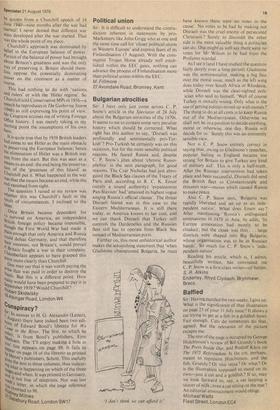Bulgarian atrocities Sir: I have only just come across C.
P. Snow's article in the Spectator of 24 July about the Bulgarian atrocities of the 1870s. It seems to me to contain some very peculiar history which should be corrected. What right has this author to say, 'Disraeli was profoundly and sentimentally pro-Turkish'? Pro-Turkish he certainly was on this occasion, but for the most sensible political reasons. He feared Russia and, despite C. P. Snow's jibes about 'chronic Russophobia' in the next paragraph, for good reasons. The Czar Nicholas had just abrogated the Black Sea clauses of the Treaty of Paris and, according to R. C. K. Ensor (surely a sound authority) 'expansionist Pan-Slavism' had 'attained its highest vogue ampng Russia's official classes'. The threat Disraeli feared was in this case to the Eastern Mediterranean. It is still there today, as America knows to her cost, and we can thank Disraeli that Turkey still controls the Dardenelles and the Russian fleet still has to operate from Black Sea instead of Mediterranean ports.
Further on, this most unhistorical author makes the astonishing statement that 'when Gladstone championed Bulgaria, he must have known there were'no votes in the cause'. No votes to be had by making out Disraeli was the cruel enemy of persecuted Christian's? Surely to discredit the other side is the most valuable thing a politician can do. One might' as well say there were no votes for Mr Wilson to be had from the Profumo scandal.
As I see it (and I have studied the question fairly deeply over a long period) Gladstone was the sentimentalist, making a big fuss over the moral issue, much as the left wing does today over South Africa or Rhodesia, while Disraeli was the clear-sighted poliician who said to himself, 'Well of course Turkey is morally wrong. Only what is the use of getting politics mixed up with morals? The thing to do at all costs is to keep Russia out of the Mediterranean. Otherwise we shall not be in a position to decide anything, moral or otherwise, one day. Russia will decide for us.' Surely this was an eminently sensible view.
Nor is C. P. Snow entirely correct in saying that. ow ing to Gladstone's speeches, popular feeling in England became too strong 'for Britain to give Turkey any kind of military aid'. This is only a half-truth. After the Russian intervention had taken place and,been successful, Disraeli did send the British fleet to Constantinople and threaten war—moves which caused Russia to make peace.
Also C. P. Snow says, 'Bulgaria was rapidly liberated and set up as an independent nation'. What does Ensor say? After mentioning Russia's undisguised annexations in 1878 in Asia, he adds, 'In Europe annexation had mostly to be cloaked; but the cloak was thin . . large districts were shaped into Big Bulgaria, whose organisation was to be in Russian hands'. So much for C. P. Snow's 'independent nation'.
Reading his article, which is, I admit, beautifully written, has convinced me C. P. Snow is a first-class writer—of fiction. S. R. Atkins
Enderley, Rhyd Clydach, Brynmawr, Brecs.


































 Previous page
Previous page